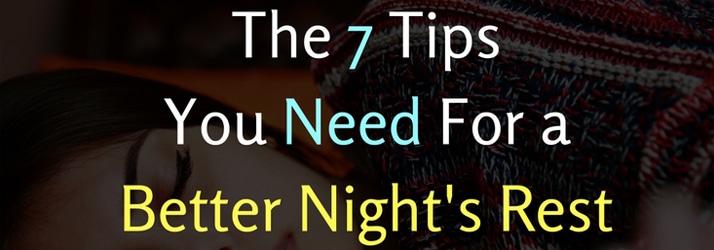Can’t Sleep? These 7 Tips Might Help You Sleep Better and Longer
Can’t Sleep? These 7 Tips Might Help You Sleep Better and Longer

One minute you climb into bed tired, exhausted, and ready for a good night's sleep. The next minute, you're wide awake and panicking because you can't fall asleep. With every hour that passes you worry as you realize your chances of a good night's sleep are getting slimmer and slimmer. All you can do is think about how you'll barely make it through the next busy day ahead of you. We are here to help at New Life Chiropractic in Fort Wayne, In.
Sleep, much like eating, drinking, and breathing, is an essential part of life. During sleep, your body (and especially your brain) recharges. Your cells repair themselves, such as in the healing and repair of your heart and blood vessels. Important hormones are released. Your brain is helped to work properly.
Unfortunately, insufficient sleep is a public health epidemic. The Center for Disease Control and Prevention (CDC) reports that 1 in 3 adults don't get enough sleep. Are you one of the estimated 50 to 70 million U.S. adults that suffer from sleep and wakefulness disorders? 1
The Culprits
While there are numerous reasons behind poor sleep, some of the most common reasons include digestive issues (especially irritable bowel syndrome, heartburn, and indigestion), uncontrolled stress and negative emotions (such as fear and anxiety), issues with overactive adrenals that release excessive stress hormones that leave the body in an excitable, aroused state, or even excessive screen time (especially smartphone use) just before bedtime. 2
Just how dangerous is sleep deprivation really?
A lack of sleep hurts more than just your mood.
Health care costs for insomnia have reached as high as 1 billion dollars a year for the U.S. 3
Insomnia's negative effects go further, though. It leads to an increased rate of absenteeism, social disability, stress, memory loss, anxiety, and pharmaceutical drug use. Aren't sleeping pills a quick fix? Most sleep-inducing medications are accompanied by adverse side effects, including hallucinations, sleep driving, dizziness, or agitation. Other side effects of sleeping pills include burning or tingling of extremities, appetite changes, gas, constipation, diarrhea, drowsiness during the day (now, that's counterproductive!), headache, heartburn, dryness in mouth, weakness, uncontrollable shaking, memory problems, and stomach pain. 4 In addition, these drugs may lead to dependence. 5
Insomnia is also linked with weight gain, sleep apnea, hypopnea, alcoholism, chronic pain, high blood pressure, GI issues, higher cancer risk, diabetes, stroke, heart disease, greater inflammation, breathing problems, osteoarthritis, and fibromyalgia. Evidence suggests a relationship between insomnia and depression and other psychiatric disorders. 6 It impairs focus, concentration, productivity, and safety in the workplace. It makes certain jobs, tasks, and activities, such as driving, potentially dangerous or even fatal. 7
It's clear we're dealing with a serious problem, here.
It doesn't have to be like this.
Foods that Make a Difference to your Sleep
What's the best way to alleviate sleep deprivation? Sleep, of course! Just how much sleep do you need?
According to the National Sleep Foundation, it depends on your age group 8 :
- Newborns: 14–17 hours
- Infants: 12–15 hours
- Toddlers 11–14 hours
- Preschoolers 10–13 hours
- School-aged children: 9–11 hours
- Teens: 8–10 hours
- Adults: 7–9 hours
- Older adults: 7–8 hours
Do you see room for improvement in your personal sleep habits? Are you looking for some simple, practical, and pharmaceutical-free (and thus, dangerous side effect-free) strategies to improve sleep and reduce or eliminate insomnia?
- As you may already know, caffeine is a central nervous system stimulator. Its stimulating effect generally lasts up to 6 hours. You personally may be more or less sensitive so it's important to take note of your own limitations. Remember, though, that caffeine can be found in tea, soda, chocolate, and even some medications. Exceeding 500 mg/day of caffeine has been shown to lead to insomnia. 9
- Sleep can affect diet quality. In general, those who sleep less tend to lean towards energy-rich foods high in fats and refined carbohydrates, but fewer vegetables; they also commonly follow irregular meal patterns. 10
Is the opposite, true, however? Can your diet affect sleep quality? Apparently, yes! Research shows that healthy diets that are rich in dietary fiber are linked to more time spent in the stage of deep, slow-wave sleep. Find dietary fiber in whole grains, fruits, vegetables, beans, legumes, nuts, and seeds.
On the other hand, diets high in sugar and saturated fat encourage sleep patterns that are lighter, more easily disrupted, and less refreshing.
In fact, the research shows that even taking a single "day off" from a healthy diet can significantly influence your sleep quality. 11 So, what's the quality of your diet?
- Lavender is one of the most used aromatic plants in aromatherapy for its promotion of calmness and tranquility. Lavender tea and essential oil have been extensively researched and found useful for various types of sleep disturbed hospital patients, including cardiac patients in the ICU and women who have just given birth. 12-14
A simple steep of two ounces of lavender tea may make the difference in your sleep tonight. 15
- Foods that impact the availability of tryptophan as well as levels of serotonin and melatonin are some of the most helpful in improving sleep. 16
Tryptophan is an amino acid that is converted to serotonin in the brain. Serotonin is a neurotransmitter involved with sleepiness. As an amino acid, tryptophan is obviously found in great quantities in protein-rich foods.
Some great sources of tryptophan include almonds, hazelnuts, pine nuts, rice, corn, lentils, chickpeas, peas, tomatoes, bananas, milk and olive oil. 17
Imagine hearing a constant hissing, buzzing or roaring high-pitched sound despite the fact that there is no external sound to be heard! Yet, 2% of Americans deal with this constant ringing in the ears, known as tinnitus. Imagine sleeping with that kind of a symptom! However research has shown that melatonin has helped tinnitus patients. 18 Melatonin is a natural hormone secreted by the pineal gland found in the brain. It impacts the sleep-wake cycle and is released when darkness occurs.
Thankfully, melatonin is naturally present in many healthy foods. Walnuts are one of the richest sources of melatonin (as well as serotonin). Other foods that provide an increase in melatonin include tart cherry juice, rice, sweet corn, almonds, strawberries, grapes, mustard seeds, olive oil, kiwifruit, pineapples, apples, tomatoes, carrots, onion and even cow's milk. 19, 20
- Extracts of valerian root are commonly used for inducing sleepiness and improving sleep quality. Valerian helps increase the amount of GABA (gamma aminobutyric acid), which helps calm brain neurons. Studies show it can help you fall asleep quicker and improve deep sleep. 21
- Another stress-relieving herbal tea that also helps induce sleep is passion flower, which may help induce sleepiness by reducing anxiety. 22
- Magnesium is involved in more than 300 biochemical reactions in the body, and the production of neurotransmitters is one of them! In fact, magnesium is the fourth most abundant mineral in the brain! Unfortunately, as we age, we are more prone to magnesium deficiency. Also, an increase in processed food intake results in a lower magnesium intake. Research shows it plays a critical role in sleep regulation and muscle relaxation.
Healthy food sources of magnesium include spinach, artichokes, almonds and cashews, avocado, dark chocolate, pumpkin seeds, bananas, and yogurt. 23-25
This goes to show that for a truly healthful lifestyle free of chronic diseases, you need both a healthy diet and healthy sleep - not just one or the other.
Some of these suggestions may work better than others for your body. Keep track of your personal results in a journal. This can help you get closer to getting a good night's sleep every night.
References
- Institute of Medicine. Sleep Disorders and Sleep Deprivation: An Unmet Public Health Problem. Washington, DC: The National Academies Press; 2006.
- http://www.webmd.com/sleep-disorders/news/20041215/cant-sleep-could-be-digestive-problem
- Sleep. 1999 May 1;22 Suppl. 2:S386-93.
- http://www.webmd.com/sleep-disorders/guide/understanding-the-side-effects-of-sleeping-pills#1
- J Am Coll Nutr. 2015;34(5):436-47. doi: 10.1080/07315724.2014.926153. Epub 2015 Mar 11.
- Sleep. 2005 Nov;28(11):1457-64.
- Am J Manag Care. 2010;16(8):617-626
- National Sleep Foundation’s updated sleep duration recommendations: final report
Sleep Health, Volume 1, Issue 4, Pages 233-243 - Rocz Panstw Zakl Hig. 2012; 63(2):141-7.
- Nutr Res. 2012 May;32(5):309-19.
- J Clin Sleep Med. 2016 Jan;12(1):19-24. doi: 10.5664/jcsm.5384.
- J Neurophysiol. 2016 May 1;115(5):2294-302. doi: 10.1152/jn.01001.2015. Epub 2016 Feb 17.
- Nurs Crit Care. 2015 Jul 27. doi: 10.1111/nicc.12198.
- Worldviews Evid Based Nurs. 2015 Dec;12(6):370-9. doi: 10.1111/wvn.12122. Epub 2015 Nov 2.
- Complement Ther Clin Pract. 2016 Feb;22:51-8. doi: 10.1016/j.ctcp.2015.12.006. Epub 2015 Dec 12.
- Nutr Res. 2012 May;32(5):309-19. doi: 10.1016/j.nutres.2012.03.009. Epub 2012 Apr 25.
- Ortega, R.M., Lo´pez Sabater, A.M., Carvajales, P.A., Requejo Marcos, A.M., 2007. DIAL Progama para evaluacio´n de dietas y gestio´n de datos en alimentacio´n. Alce Ingenieria 2007. http://www.alceingenieria.net/nutricion.html.
- Prog Brain Res. 2007;166:331-3
- Curr Signal Transduct Ther. 2014 Dec; 9(3): 148–155.
- Journal of Food Composition and Analysis 22 (2009) 177–183
- Am J Med. 2006 Dec;119(12):1005-12.
- Homeopathy. 2016 Feb;105(1):84-91.
- J Res Med Sci. 2012 Dec; 17(12): 1161–1169.
- Am J Physiol Regul Integr Comp Physiol. 2000 Dec;279(6):R2173-8.
- Magnesium 3:145–151
Monday
9:00am - 11:00am
3:00pm - 6:00pm
Tuesday
5:30pm - 6:30pm
Wednesday
9:00am - 11:00am
3:00pm - 6:00pm
Thursday
9:00am - 11:00am
3:00pm - 6:00pm
Friday
Closed
Saturday
Closed
Sunday
Closed
New Life Chiropractic
2051 Reed Road
Fort Wayne, IN 46815
(260) 471-5433


